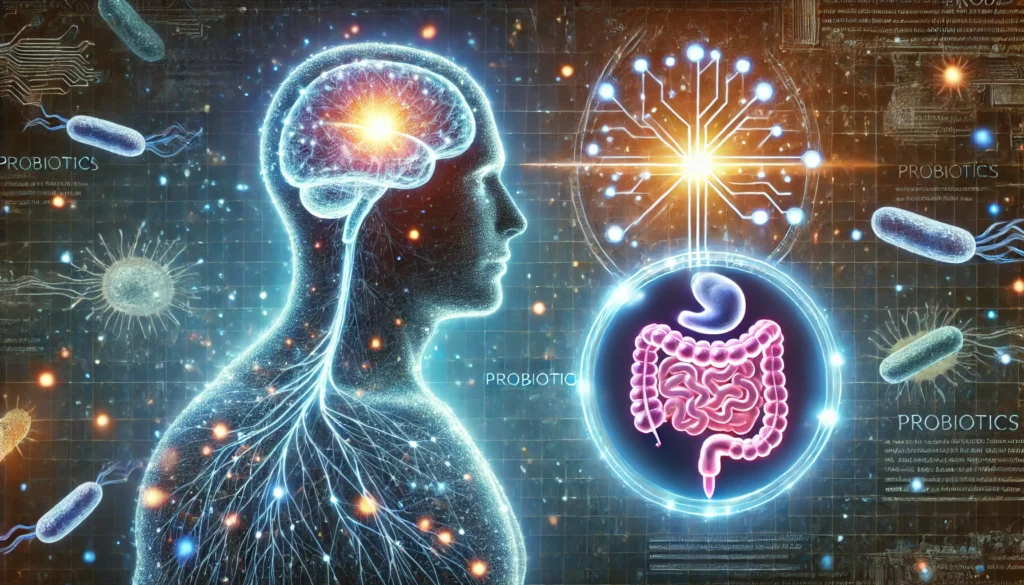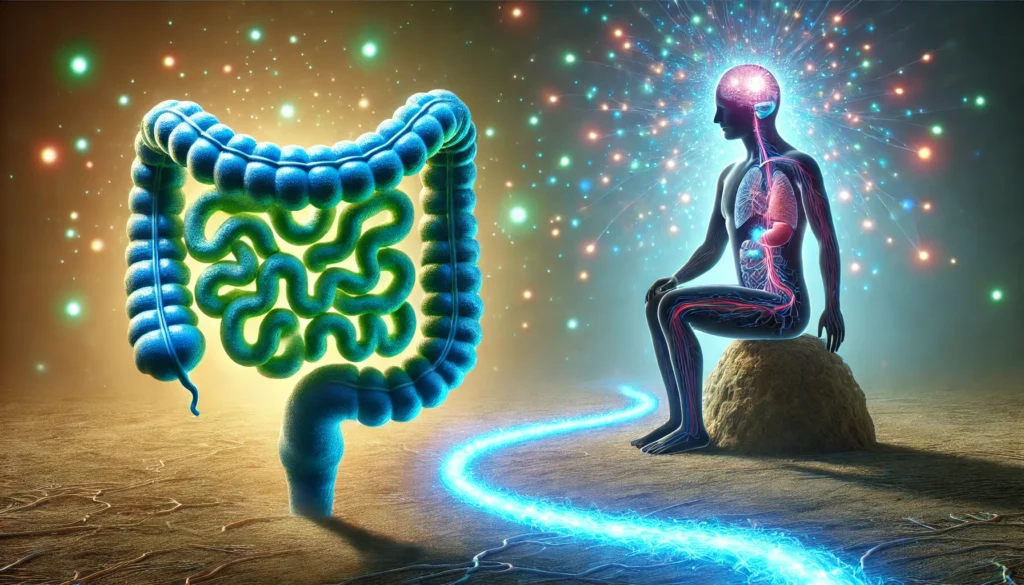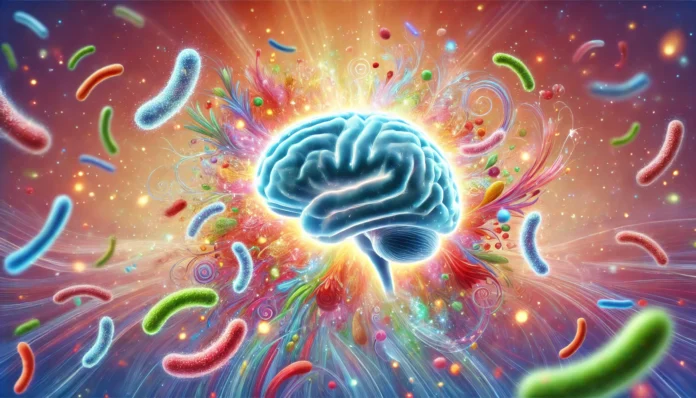Introduction: The Gut-Brain Connection and the Role of Probiotics
The human body is home to trillions of microorganisms, many of which play essential roles in maintaining health and well-being. Among these, probiotic bacteria have garnered significant attention for their contributions to gut health, immune function, and even mental well-being. The relationship between the gut and the brain, often referred to as the gut-brain axis, underscores the profound impact that gut microbiota can have on cognitive function, emotional stability, and overall mental health. By exploring the mechanisms through which probiotics influence brain function, we can better understand how these beneficial microorganisms contribute to psychological resilience and cognitive clarity.
You may also like: How to Improve Gut Health Naturally: Science-Backed Tips for a Stronger Microbiome
The modern diet, high in processed foods and artificial additives, often lacks the diversity of probiotic-rich foods needed to sustain a healthy gut microbiome. This deficiency can lead to imbalances in gut bacteria, potentially contributing to mood disorders, anxiety, and cognitive decline. Fortunately, consuming probiotic food sources, such as fermented vegetables, yogurt, and kefir, can help restore the balance of good bacteria in the gut, ultimately supporting mental health. Additionally, probiotic supplements and probiotic meds have become increasingly popular for individuals seeking to optimize their cognitive function and emotional well-being.
In this comprehensive exploration, we will delve into the benefits of probiotics for mental health, examining the ways in which probiotic bacteria impact brain chemistry, cognitive performance, and emotional regulation. We will also highlight the best natural probiotics, discuss what makes probiotic strains effective, and evaluate how a probiotic diet can support mental well-being. By understanding how probiotics work, individuals can make informed choices to enhance their cognitive function and emotional stability through diet and supplementation.
Understanding Probiotics: What They Are and How They Work
Probiotics are live microorganisms that confer health benefits when consumed in adequate amounts. These beneficial bacteria, primarily belonging to the Lactobacillus and Bifidobacterium genera, help maintain a balanced gut microbiome, support digestion, and modulate immune function. But what makes something probiotic? A probiotic organism must survive the acidic environment of the stomach, adhere to the intestinal lining, and positively influence the host’s health. These bacteria produce beneficial compounds such as short-chain fatty acids and neurotransmitters that influence both gut and brain function.
A key question many people ask is: “What does probiotic mean?” The term probiotic originates from the Greek words “pro” (meaning “for”) and “bios” (meaning “life”), highlighting their role in promoting health. Unlike harmful bacteria that cause infections and illness, probiotic bacteria contribute to maintaining intestinal harmony, supporting the immune system, and influencing neurological processes. Understanding how probiotics work can help individuals make informed dietary choices that improve both gut and brain health.
Additionally, the benefits of prebiotics and probiotics often go hand in hand. Prebiotics, which are non-digestible fibers found in foods such as garlic, onions, and bananas, serve as fuel for probiotic bacteria, allowing them to thrive and exert their beneficial effects. By incorporating both prebiotics and probiotics into the diet, individuals can maximize the advantages of these microorganisms for cognitive and mental health.
The Gut-Brain Axis: How Probiotics Influence Mental Health
The gut-brain axis is a bidirectional communication system linking the gastrointestinal tract and the central nervous system. This intricate network involves the vagus nerve, the immune system, and gut-derived neurotransmitters that influence brain function. Emerging research suggests that the composition of gut microbiota can impact mood regulation, stress response, and even neuroplasticity, the brain’s ability to adapt and reorganize.
Probiotic bacteria play a vital role in this connection by producing neurotransmitters such as serotonin, dopamine, and gamma-aminobutyric acid (GABA), which regulate mood and emotional stability. Approximately 90% of serotonin, a neurotransmitter often associated with happiness and well-being, is produced in the gut. Disruptions in gut microbiota balance have been linked to conditions such as depression, anxiety, and cognitive decline, emphasizing the importance of maintaining a healthy microbiome.
One of the key benefits of taking probiotics is their ability to modulate stress and anxiety levels. Clinical studies have shown that individuals consuming probiotic-rich diets or supplements experience reduced cortisol levels, the primary stress hormone. The presence of good bacteria in the gut helps regulate inflammation, which is increasingly recognized as a contributing factor in mental health disorders. By reducing systemic inflammation and oxidative stress, probiotics contribute to a more stable and resilient mental state.
Probiotics and Cognitive Function: Enhancing Memory and Focus
Cognitive function encompasses various mental processes, including memory, attention, problem-solving, and decision-making. Research has demonstrated that probiotic food sources and supplements can enhance cognitive abilities by improving gut microbiota composition and reducing neuroinflammation. Studies on both animal models and human participants suggest that probiotic interventions lead to improved memory retention, faster cognitive processing, and enhanced problem-solving skills.

One of the ways probiotics support cognitive function is by increasing the production of brain-derived neurotrophic factor (BDNF), a protein that promotes the growth and survival of neurons. BDNF plays a crucial role in neuroplasticity, allowing the brain to adapt and form new neural connections. This is particularly important for learning and memory, as higher levels of BDNF are associated with improved cognitive performance and reduced risk of neurodegenerative diseases such as Alzheimer’s and Parkinson’s.
Additionally, probiotics have been shown to mitigate brain fog, a condition characterized by confusion, forgetfulness, and lack of mental clarity. By supporting gut health, probiotics enhance nutrient absorption, regulate blood sugar levels, and reduce inflammation, all of which contribute to sharper cognitive function. Individuals who experience brain fog due to poor diet, stress, or gastrointestinal issues may find relief by incorporating probiotic-rich foods into their daily routine.
Mood Regulation and Emotional Stability: The Psychological Benefits of Probiotics
Mood disorders such as depression and anxiety have become increasingly prevalent in modern society, often linked to chronic stress, poor diet, and imbalances in gut microbiota. The advantages of probiotics and prebiotics in mental health management stem from their ability to restore gut microbiome balance and support neurotransmitter production. By increasing beneficial bacteria, probiotics help alleviate symptoms of depression and anxiety, leading to improved emotional stability and overall well-being.
A growing body of research supports the notion that probiotic interventions can serve as complementary therapies for mood disorders. Clinical trials have demonstrated that individuals consuming probiotic supplements experience significant reductions in depressive symptoms compared to placebo groups. The mechanism behind this effect involves the modulation of the hypothalamic-pituitary-adrenal (HPA) axis, the body’s central stress response system. By reducing excessive cortisol production and promoting a balanced inflammatory response, probiotics contribute to a calmer and more resilient psychological state.
Furthermore, food with good bacteria, such as kimchi, miso, and tempeh, can provide natural support for mental health. These probiotic-rich foods not only enhance gut microbiota diversity but also supply essential nutrients that support brain function. The best natural probiotics can be found in a variety of fermented foods, making it easier for individuals to incorporate them into their diets for improved mood regulation and cognitive performance.

Frequently Asked Questions (FAQ) on Probiotics and Mental Health
1. How do probiotics influence neurotransmitter production and mental health?
Probiotics contribute to neurotransmitter production by supporting the synthesis of serotonin, dopamine, and gamma-aminobutyric acid (GABA), which play crucial roles in mood regulation and cognitive function. The gut microbiome is responsible for producing nearly 90% of the body’s serotonin, and an imbalance in gut bacteria can lead to mood disorders such as depression and anxiety. Certain probiotic bacteria, including Lactobacillus and Bifidobacterium species, help regulate neurotransmitter activity, improving emotional stability. Additionally, probiotics reduce inflammation and oxidative stress, both of which are linked to neurological conditions and mood imbalances. By restoring a balanced gut microbiome, probiotics can support overall mental well-being and enhance cognitive function.
2. What makes something probiotic, and how do you determine its effectiveness?
For a microorganism to be classified as a probiotic, it must meet specific criteria, including being a live strain that provides health benefits when consumed in adequate amounts. The effectiveness of a probiotic depends on factors such as its ability to survive stomach acid, adhere to intestinal cells, and modulate immune and neurological functions. Strains such as Lactobacillus rhamnosus and Bifidobacterium longum have been studied for their benefits in reducing anxiety and improving cognitive function. Additionally, effective probiotics should be supported by clinical research demonstrating their role in gut and brain health. Choosing probiotic foods or supplements with well-researched strains ensures maximum benefits for mental and cognitive well-being.
3. What are probiotics meds, and how do they differ from dietary probiotics?
Probiotic medications, or “probiotics meds,” are formulated to target specific health conditions and are often prescribed by healthcare professionals. Unlike dietary probiotics, which are available in fermented foods and supplements, probiotic medications are developed using clinically validated strains to treat conditions such as irritable bowel syndrome (IBS), depression, or antibiotic-associated diarrhea. These medications undergo rigorous testing to ensure potency, viability, and therapeutic effectiveness. Some probiotic meds are designed to work synergistically with prebiotics, enhancing their benefits for gut and brain health. When considering probiotic treatment, consulting a healthcare provider ensures appropriate strain selection based on individual health needs.
4. How does probiotic work in reducing stress and anxiety?
Probiotics work to reduce stress and anxiety by modulating the gut-brain axis, regulating neurotransmitters, and lowering cortisol levels, the primary stress hormone. Certain probiotic bacteria enhance the production of GABA, a neurotransmitter that promotes relaxation and reduces excessive neural activity. Additionally, probiotics help maintain the integrity of the intestinal barrier, preventing harmful substances from triggering systemic inflammation, which has been linked to stress-related disorders. Regular consumption of probiotic food sources, such as kefir and miso, can improve gut microbiota composition, leading to better resilience against stress. Emerging research also suggests that probiotic supplementation can positively influence brain function by enhancing neuroplasticity and cognitive adaptability.
5. What vitamins do probiotic drinks have, and how do they support brain health?
Probiotic drinks often contain essential vitamins such as B-complex vitamins (B6, B12, folate) and vitamin D, which play critical roles in brain health and cognitive function. B vitamins are involved in neurotransmitter synthesis, helping regulate mood and mental clarity. Vitamin D has been linked to reduced risks of depression and cognitive decline by modulating immune responses and supporting neural function. Some probiotic drinks also contain antioxidants, which help protect brain cells from oxidative damage. Incorporating probiotic beverages into a daily routine can enhance both gut microbiome diversity and overall neurological well-being.
6. What are the best natural probiotics for improving cognitive function?
The best natural probiotics for cognitive function include fermented foods rich in beneficial bacteria, such as sauerkraut, kimchi, yogurt, and kombucha. These foods contain live cultures that help balance the gut microbiome, enhancing mental clarity and memory retention. Some strains, like Lactobacillus plantarum and Bifidobacterium breve, have been shown to improve cognitive flexibility and attention span. Including a variety of probiotic-rich foods in the diet ensures exposure to diverse bacterial strains that support brain health. Additionally, pairing natural probiotics with fiber-rich prebiotic foods amplifies their beneficial effects on cognitive performance.
7. What can probiotics help with beyond mental health benefits?
In addition to supporting mental health, probiotics can aid digestion, enhance immune function, and reduce inflammation. They help restore gut flora balance after antibiotic use, preventing issues such as diarrhea and bloating. Some probiotic strains have been shown to support skin health by reducing acne and eczema symptoms. Probiotics also play a role in metabolic health by improving insulin sensitivity and reducing obesity-related inflammation. Their broad spectrum of benefits makes them valuable for overall health and wellness, extending beyond cognitive and psychological well-being.
8. What is the purpose of probiotics in maintaining long-term mental resilience?
The primary purpose of probiotics in mental health is to support resilience against stress, mood disorders, and cognitive decline by stabilizing the gut-brain axis. Long-term probiotic intake has been associated with lower risks of neurodegenerative diseases such as Alzheimer’s and Parkinson’s. Probiotics contribute to sustained mental clarity by enhancing gut microbiota diversity, which is linked to improved executive function and problem-solving abilities. They also help regulate the body’s inflammatory response, a key factor in protecting brain cells from premature aging. Maintaining a consistent intake of probiotic-rich foods can serve as a proactive strategy for preserving cognitive health over time.
9. What are the advantages of probiotics and prebiotics when consumed together?
Combining probiotics and prebiotics, known as synbiotics, offers enhanced gut health benefits by ensuring probiotic bacteria have the necessary nutrients to thrive. Prebiotics, found in foods such as garlic, leeks, and asparagus, act as fuel for probiotics, enhancing their survival and activity in the gut. This combination supports a more diverse and resilient microbiome, which is essential for both digestive and cognitive health. Studies suggest that synbiotic intake may amplify the benefits of probiotics for mental health by promoting neurotransmitter synthesis and reducing inflammation. Individuals looking to maximize the impact of probiotics should consider incorporating prebiotic-rich foods into their diet alongside probiotic sources.
10. What can probiotics do for you in terms of daily cognitive performance?
Probiotics can enhance daily cognitive performance by improving focus, memory, and mental clarity through their impact on gut microbiota. A balanced microbiome aids in optimal nutrient absorption, ensuring the brain receives essential compounds such as omega-3 fatty acids, amino acids, and vitamins. Probiotics also help regulate blood sugar levels, preventing energy crashes that contribute to brain fog. Regular consumption of probiotic foods or supplements can result in increased mental stamina, reducing fatigue and enhancing productivity. For individuals seeking sharper cognitive abilities, incorporating probiotics into their daily regimen is a natural and effective strategy.

Conclusion: Harnessing the Power of Probiotics for Mental and Cognitive Well-Being
The connection between gut health and mental well-being is becoming increasingly recognized in the scientific community, highlighting the significance of probiotics in maintaining cognitive and emotional stability. By incorporating probiotic food sources and supplements into the diet, individuals can optimize gut microbiota composition, support neurotransmitter production, and enhance neuroplasticity. The health benefits of probiotics extend beyond digestion, influencing memory, focus, stress resilience, and overall psychological well-being.
As research continues to uncover the profound impact of probiotics on mental health, it is essential to recognize the role of diet and lifestyle in supporting a healthy microbiome. Choosing probiotic-rich foods, supplementing with high-quality probiotic bacteria, and maintaining a balanced diet can contribute to improved cognitive function and emotional resilience. By prioritizing gut health, individuals can cultivate a stronger foundation for mental well-being and long-term cognitive vitality.
gut health and brain function, microbiome and mental health, fermented foods for wellness, gut flora and mood, probiotics for anxiety relief, digestive health and cognition, gut microbiota balance, natural brain boosters, holistic mental wellness, probiotic-rich diet, mood-enhancing foods, brain-gut axis research, immune system and probiotics, dietary probiotics for brain health, fermented nutrition benefits, neuroprotective dietary strategies, gut-brain communication, stress resilience through diet, inflammation and mental clarity, functional nutrition for mental health
Further Reading:
How do Probiotics Help to Boost Mood and Cognitive Function?
Probiotics’ Effects in the Treatment of Anxiety and Depression
Psychobiotics and the Manipulation of Bacteria–Gut–Brain
Disclaimer
The information contained in this article is provided for general informational purposes only and is not intended to serve as medical, legal, or professional advice. While Health11News strives to present accurate, up-to-date, and reliable content, no warranty or guarantee, expressed or implied, is made regarding the completeness, accuracy, or adequacy of the information provided. Readers are strongly advised to seek the guidance of a qualified healthcare provider or other relevant professionals before acting on any information contained in this article. Health11News, its authors, editors, and contributors expressly disclaim any liability for any damages, losses, or consequences arising directly or indirectly from the use, interpretation, or reliance on any information presented herein. The views and opinions expressed in this article are those of the author(s) and do not necessarily reflect the official policies or positions of Health11News.


